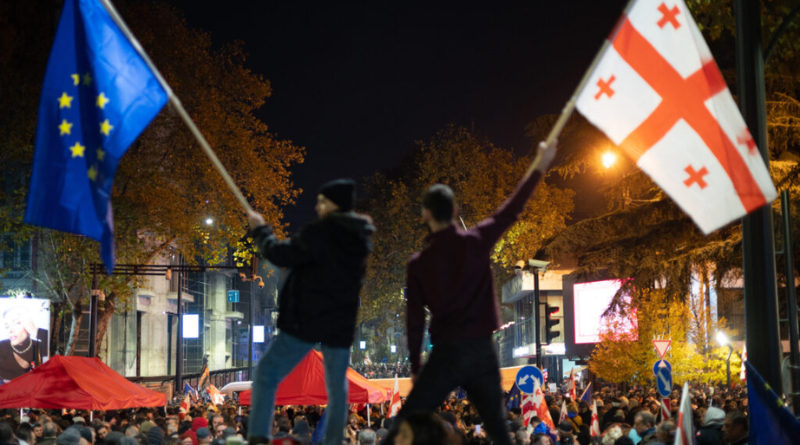Abandoning Georgia to the Kremlin would be a big geopolitical blunder
By Zviad Adzinbaia, Doctoral Fellow at The Fletcher School
Georgia’s disputed October 26 parliamentary elections have plunged the country into a democratic crisis, jeopardizing its EU candidacy and Euro-Atlantic trajectory. At the core of the crisis lies evidence of electoral manipulation, Russian interference, and a ruling party apparently determined to consolidate its grip on power.
Left with no other institutional mechanisms to defend democracy, Georgia’s united opposition, led by President Salome Zourabichvili, has launched a nonviolent protest movement. The country now stands at a pivotal crossroads in its modern history, with the outcome of the current confrontation set to have geopolitical consequences that will reverberate far beyond Georgia’s borders.
President Zourabichvili’s denunciation of the October parliamentary elections as illegitimate has shaken the nation. She has claimed that evidence of Russian interference and systematic election manipulation reveal a ruling party embracing increasingly authoritarian tactics.
Zourabichvili and other opposition figures accuse the governing Georgian Dream party of weaponizing anti-Western and anti-Ukrainian narratives in order to gain political advantage during the election campaign. This included claims that the country’s opposition forces are part of a Western-led “Global War Party” that is allegedly seeking to open a “second front” against Russia.
Critics claim the events of October 26 in Georgia were less an election and more a performance designed to entrench the political status quo in the country. Independent exit polls revealed a decisive majority for Western-leaning opposition parties. Nevertheless, Georgian Dream declared victory.
Reports from international observers and Georgian civil society reveal a troubling reality including widespread evidence of glaring irregularities such as altered voter turnout figures and statistical anomalies. The vote itself featured numerous examples of violence and intimidation.
Developments in Georgia are geopolitically significant for the surrounding region. Positioned at the crossroads of Europe and Asia, Georgia serves as a critical energy transit hub and a potential model of democratic resilience in a region where autocracies and empires have long vied for dominance.
Since coming to power in 2012, the Georgian Dream party has increasingly aligned with authoritarian regimes. This has included favoring Chinese firms over American companies for projects like the Anaklia deep sea port, and facilitating Russian sanctions evasion.
Allowing Georgia to slip into authoritarian hands would send a dangerous message that democratic values are negotiable. For the US and EU, this is not just about Georgia. At stake is the West’s credibility in the wider region. Georgia aligns with Western foreign policy priorities such as countering the expansion of Chinese, Russian, and Iranian influence in the Black Sea region.
Georgia’s united democratic opposition and civil society have shown they are ready to lead a peaceful transition of power and position Georgia as a dependable Western ally. Achieving this vision, however, demands coordinated action from Washington, Brussels, and London.
First, new elections under international supervision are necessary. Only transparent elections monitored by independent actors can succeed in restoring democratic integrity and advance Georgia’s EU accession prospects.
Second, the West should impose targeted sanctions on Georgian Dream leaders and their enablers for undermining democracy and advancing Russian interests. These sanctions would send a clear message of support for Georgia’s democratic aspirations.
The US could expand current visa bans to include financial restrictions, with Brussels doing likewise. The prompt adoption of pending legislative bills in the US Congress to support the Georgian people would further demonstrate decisive commitment.
Third, Georgia’s civil society, and independent media need greater protection from repression. With a Russian-inspired “foreign agents” law now in place in Georgia, targeted funding and diplomatic support are crucial to ensuring these democratic pillars remain free and accountable.
Coordinated transatlantic pressure is crucial. Decisive action on Georgia can help strengthen a Western ally and stabilize a critical region, while also bolstering democracy at a pivotal moment. Georgia is far from a lost cause, but it will require bold Western leadership to prevent the country’s capture by the Kremlin.
(This post is republished from Atlantic Council.)

